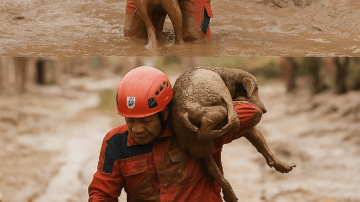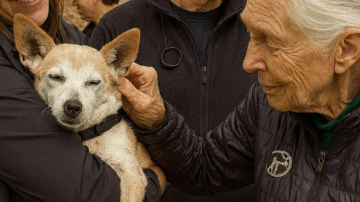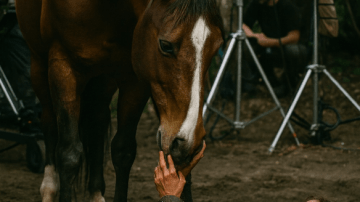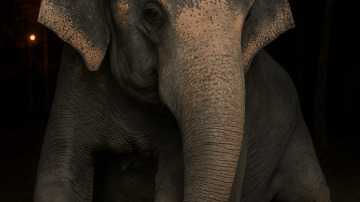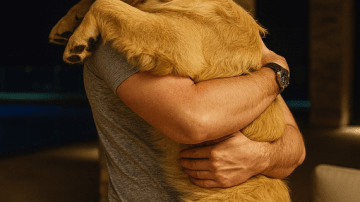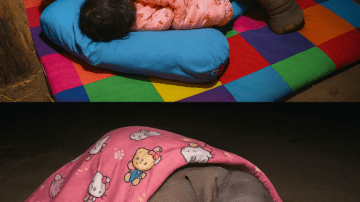In the heart of a bustling city, where the noise of traffic drowned out most cries for help, an unimaginable scene unfolded one ordinary afternoon. Children, carefree and playful, were running along the narrow street when they suddenly froze. In a shallow, dirty puddle, huddled in pain, lay a small creature whose fragile body trembled with every breath. It was a dog—weak, wounded, and barely clinging to life. His faint cries pierced the children’s innocent hearts. Shocked and moved by compassion, they knew at once they could not leave him there. With hands trembling but determined, they approached, whispering soft words of comfort as though he could understand their promise of safety. That little dog was later named Juno, and this is his heart-wrenching story—a story of cruelty, but also of resilience, healing, and the incredible power of kindness.
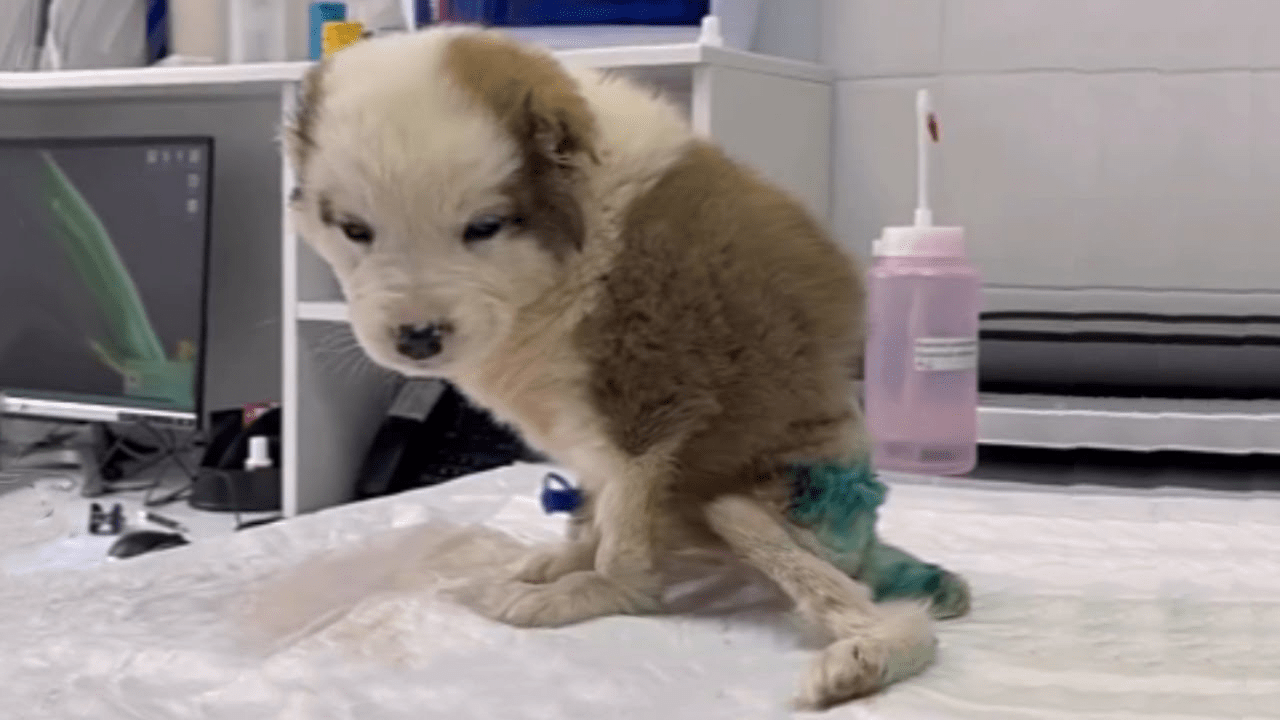
The children, tears in their eyes, rushed Juno to a small nearby clinic. Volunteers gathered around, their expressions shifting from concern to horror as they examined the little dog. The findings revealed a truth so grim that many struggled to hold back their own tears. Juno’s tiny frame bore the marks of unspeakable abuse. X-rays confirmed fractures in both his leg and pelvis, the result of deliberate harm. But that was not all. His frail body carried fresh, open wounds, infected and raw. And, most haunting of all, his eyes and tail had been cruelly cut off with scissors. The room fell into heavy silence. How could any human hand inflict such pain on an innocent being? Horror, sorrow, and anger mingled in the hearts of the volunteers, but one thing was certain—they had to act quickly if Juno was to have any chance at survival.

Under sedation, the medical team began their careful work. They cleaned the infected wounds, installed drainage to combat the spreading pus, and stabilized his fragile body. Every touch was gentle, every movement precise, as though each volunteer was silently apologizing for the cruelty Juno had endured. But physical healing was only half the battle. His hollow eyes, once filled with pain and fear, reflected deep emotional scars. He flinched at sudden movements, whimpered at the sound of footsteps, and curled into himself as though expecting more harm. The volunteers knew they had to heal not only his body but also his spirit. It was then that they gave him a name: Juno. To them, the name symbolized a new beginning, a chance for rebirth, and a reminder that even the most broken soul deserved dignity and love.

Though the initial treatments saved Juno from immediate danger, his broken bones required specialized care. Arrangements were made to transfer him to the Commodore Veterinary Clinic, a place known for its advanced medical expertise and compassionate team. The journey was not easy. Every bump on the road seemed to remind Juno of his pain, yet his quiet endurance spoke volumes. It was as if he sensed the determination of those fighting for his life and chose to hold on just a little longer. At Commodore, skilled veterinarians took over. They tended to his fractures with surgical precision, aligning bones, securing them with pins, and setting the foundation for healing. What followed were countless hours of treatment, rehabilitation, and patient care.
Days blurred into weeks, but something remarkable began to happen. Juno, once a shadow of life, slowly started to recover. His body grew stronger, his wounds closed, and his bones began to mend. Then came a moment that left the volunteers breathless: Juno wagged his tail. For the first time since his ordeal, he allowed himself to express joy—a small gesture, yet one so powerful it brought tears to every eye in the room. With each passing day, Juno learned to trust again. He no longer shrank away from gentle hands. Instead, he leaned into them, seeking the warmth he had once been denied. His spirit, once crushed, flickered with resilience.

Juno’s transformation was nothing short of miraculous. The dog who had been discarded and broken now stood as a symbol of survival. His journey inspired not only the volunteers who saved him but also countless others who heard his story. People began to talk—not just about Juno, but about the larger issue his story represented: the cruelty that animals endure in silence, and the responsibility each person carries to stand against it. Juno’s suffering ignited conversations, sparked compassion, and reminded many that the smallest act of kindness can change a life forever.
For the volunteers who had first found him crouched in that filthy puddle, Juno’s survival was more than just a rescue. It was a revelation. In saving him, they discovered something within themselves: the enduring strength of compassion, the healing power of empathy, and the unbreakable bond that forms when humans choose to care for those who cannot speak for themselves. Even as Juno prepared to embark on a new chapter of his life, one filled with love and security, his rescuers carried with them a deep sense of gratitude. They realized that Juno had given them as much as they had given him—the reminder that even in the darkest of times, hope can be found, and light can be shared.
Juno’s journey from cruelty to healing will forever serve as a testament to resilience. Though he endured unimaginable pain, he survived. Though he bore scars, both seen and unseen, he chose to live. And through the kindness of strangers, he was able to transform into a beacon of hope for others. His story continues to inspire those who hear it—to stand up against cruelty, to spread compassion, and to make the world a safer, kinder place for all living beings.
Juno is more than just a survivor. He is a reminder that love can heal wounds deeper than flesh, that resilience can rise from the ashes of suffering, and that hope can shine even in the bleakest moments. For every creature like Juno, may his story remind us to listen, to care, and to act. Because sometimes, the smallest act of compassion is enough to change not only one life—but the world.

